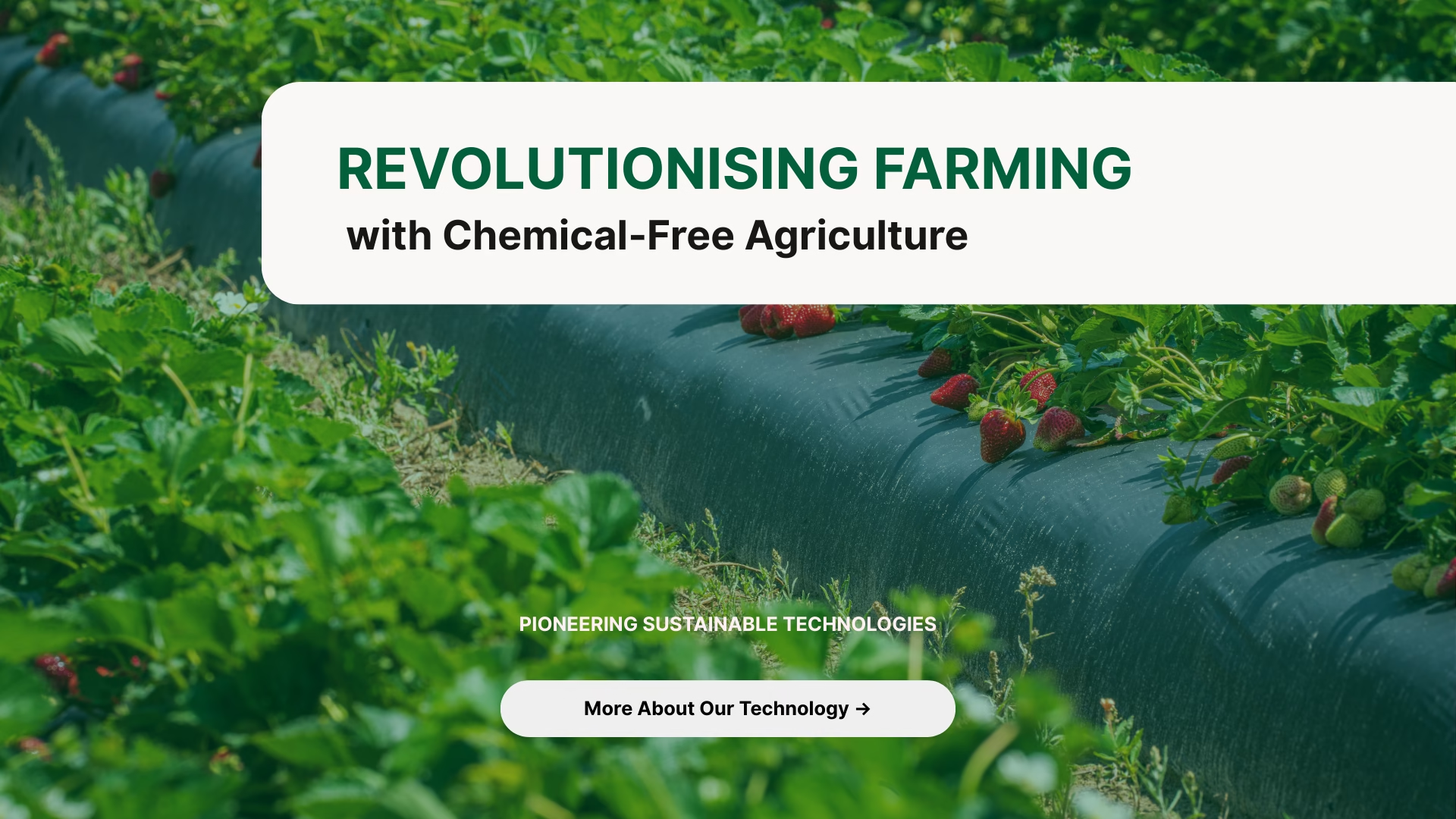The Greener Technology Group is introducing agricultural innovations that eliminate synthetic chemicals, promoting clean food systems and regenerative land practices for a healthier planet.
The Hidden Cost of Conventional Farming
For decades, modern agriculture has relied heavily on synthetic fertilisers, pesticides, and herbicides to maximise crop yields. While these chemicals have increased short-term productivity, they’ve also led to long-term damage—contaminating soil, polluting water sources, and harming biodiversity.
More alarmingly, chemical residues from these products are now found in the food we eat and even in our own bodies. Studies have linked pesticide exposure to hormonal disruption, neurological issues, and chronic diseases such as cancer. With global food demand expected to rise sharply by 2050, the need for safer, sustainable alternatives has never been more urgent.
What Is Chemical-Free Agriculture?
Chemical-free agriculture refers to farming practices that avoid synthetic inputs and instead rely on natural processes to nourish crops and manage pests. These methods include:
- Organic composting
- Biological pest control
- Crop rotation
- Soil regeneration techniques
- Natural fertilisation using bio-based nutrients
These approaches not only reduce environmental harm but also improve soil health, increase biodiversity, and produce cleaner, safer food for consumers.
The Science Behind Sustainable Farming
Research consistently shows that synthetic agrochemicals degrade soil quality over time, leading to reduced fertility and increased dependence on artificial inputs. In contrast, chemical-free agriculture supports the microbiome of the soil, enhancing nutrient availability and water retention naturally.
A growing body of evidence suggests that regenerative farming techniques can sequester carbon, combat climate change, and restore degraded farmland to full productivity—all without relying on harmful synthetic compounds.
Moreover, eliminating chemical runoff from farms helps protect rivers, lakes, and groundwater from contamination, reducing the risk of toxic algae blooms and aquatic ecosystem collapse.
The Role of The Greener Technology Group
At the forefront of this movement is The Greener Technology Group, which is actively bringing verified, scalable, and scientifically backed chemical-free agricultural solutions to market.
One of its key initiatives includes licensing and distributing non-toxic soil enhancers, natural pest deterrents, and bio-stimulants that boost plant growth without synthetic additives.
By working directly with farmers, researchers, and regulatory bodies, The Greener Technology Group ensures that these technologies meet high environmental standards while remaining economically viable for large-scale production.
Real-World Applications of Chemical-Free Farming
Already, chemical-free agricultural practices are being adopted across Australia and beyond, with promising results:
- Organic vineyards in South Australia are replacing synthetic fungicides with plant-based alternatives
- Regenerative grain farms in New South Wales are improving soil health through cover cropping and microbial soil support
- Hydroponic urban farms in Melbourne are using biologically active nutrients to grow fresh produce without chemical inputs
These examples show that it’s not only possible to farm sustainably—but also more profitable and resilient in the long run.
Benefits of Chemical-Free Farming
Switching to chemical-free agriculture offers a wide range of benefits:
- Healthier food: Reduced chemical residue in fruits, vegetables, and grains
- Cleaner water: Less runoff of toxic substances into rivers and aquifers
- Stronger soil: Improved structure and microbial activity leads to better yields
- Safer working conditions: Farmers and agricultural workers are no longer exposed to hazardous chemicals
- Climate resilience: Healthier soils retain water better and store more carbon
This shift isn’t just about sustainability—it’s about building a future where food production works in harmony with nature, not against it.
What Consumers Can Do
Consumers play a crucial role in driving this transformation. By choosing organic or chemical-free produce, supporting local farms, and advocating for transparency in food labelling, individuals can help accelerate the transition to safer farming practices.
Some simple steps include:
- Choosing organic-certified products whenever possible
- Supporting regenerative farming initiatives and local food networks
- Demanding clearer ingredient and farming practice disclosures on product packaging
- Reducing reliance on processed foods that often contain traces of synthetic agricultural inputs
Conclusion: A Cleaner Future for Food and Farming
As awareness grows around the dangers of chemical-intensive agriculture, the shift toward chemical-free farming is gaining momentum. With companies like The Greener Technology Group leading the way, sustainable alternatives are becoming more accessible, effective, and affordable.
We’re no longer limited to a choice between high-yield farming and environmental protection. Thanks to innovation and education, we can now achieve both—and build a food system that’s safe, sustainable, and regenerative for generations to come.
Key Summary
✓ Chemical-free agriculture eliminates synthetic fertilisers, pesticides, and herbicides from food production.
✓ Synthetic agrochemicals have been linked to soil degradation, water pollution, and human health risks.
✓ Regenerative farming improves soil health, biodiversity, and carbon sequestration.
✓ The Greener Technology Group promotes access to verified chemical-free agricultural technologies and best practices.
✓ Consumer demand is helping drive the shift toward cleaner food systems and healthier ecosystems.
✓ Adopting chemical-free practices supports long-term sustainability and climate resilience.

